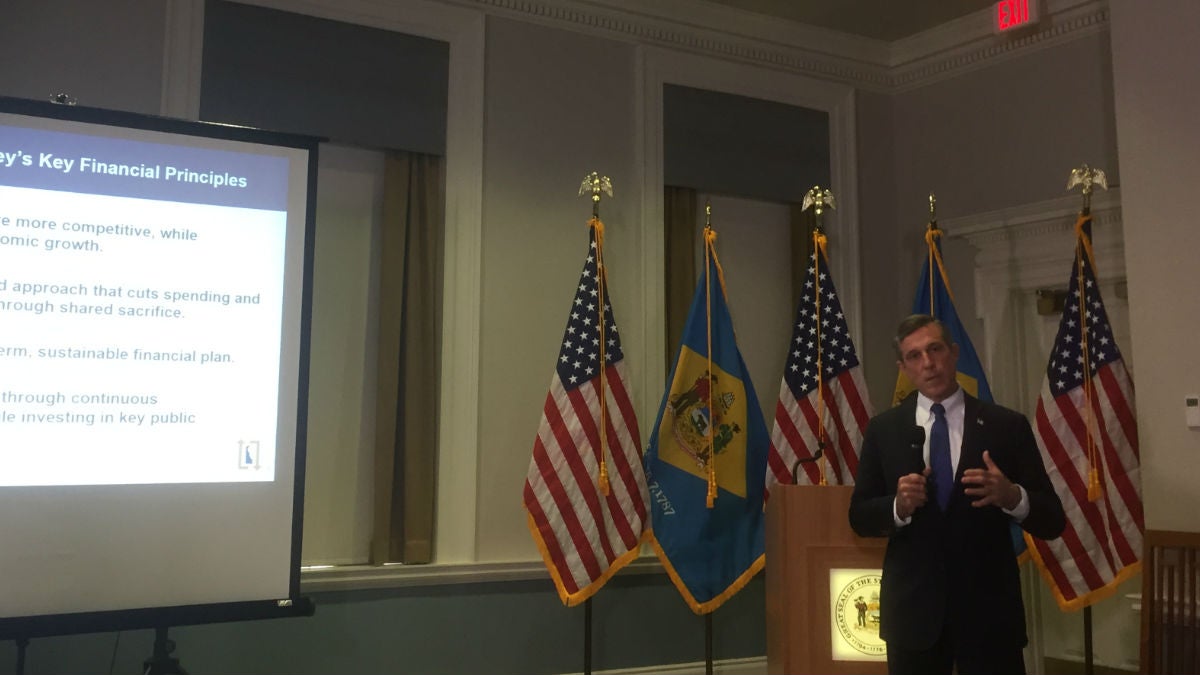Gov. Carney introduces proposed budget of “really tough decisions” [video]
Listen
Delaware Gov. John Carney delivers his budget proposal to state lawmakers in Dover. (Zoe Read/WHYY)
Gov. John Carney, D-Delaware, announced his proposed $4.1 billion budget for fiscal year 2018, beginning July 1, on Thursday.
The budget, which the Governor said will address a $385.5 million deficit and an imbalance of revenues and expenses, is a 0.29 percent growth from the current budget.
Carney said he believes his proposed budget will make Delaware more competitive, while promoting economic growth. He said it will use a balanced approach that cuts spending and raises revenue, build a long-term sustainable financial plan and contain costs through continuous improvements, while investing in key public services.
“Everything we do, we want to make sure we’re making Delaware more competitive. Because the best way to address a structural budget shortfall is to grow out of it, and that’s not necessarily going to happen in the first year,” Carney said. “But you want to make sure that you’re still making investments in those things that make Delaware an attractive place to live and work and raise your family.”
In addition to the looming deficit, Delaware also faces increased expenses and decreasing revenues. Expanding expenditures include increased school enrollment and a larger special education population. Medicaid and state employee health insurance also costs the state $800 million each.
Revenues are expected to be $3.9 billion this year, while projected expenses for the coming year is $4.2 billion. Projected revenues also are $100 million less than anticipated in June of last year.
Carney, who hosted several public meetings over the last couple months with legislators and residents, said he took Delawarean’s concerns into consideration when drafting the budget.
The proposed budget includes several cuts to healthcare. The slashes in funding include reducing employee healthcare costs by $6.5 million by adjusting the cost share, and eliminating the health insurance premium preference for two state employees who are married. Carney also proposes saving $2.6 million by reducing Medicaid dental reimbursements by 14 percent.
However, the Governor also proposed fully funding Medicaid for low-income Delawareans, individuals with disabilities and seniors for long-term care, which would cost the state $11.8 million. He also wants to set aside $1 million for substance abuse treatment services.
In the area of education, Carney proposes $3.3 million in cuts to higher education, which is a reduction of 2 percent in each institution. The Governor also proposes eliminating $15 million to school district and charter school operations—but the districts would decide which operations would lose funding.
There also would be a $22 million reduction in the Educational Sustainment Fund, which is a flexible account school districts can use for a number of programs, but Carney’s plan would allow school districts to cover the reduced amount by raising property taxes through legislation.
Carney also proposed funding new teachers at a cost of $25.1 million. His budget would use $4.7 million to maintain investments in early childhood education and set aside $1 million for opportunity grants for schools serving disadvantaged students.
Some Democrats and Republicans in attendance said they disagree with some of Carney’s educational proposals.
“As someone with two children in local public schools I have some concerns,” said State Sen. Ernie Lopez, R-Elsmere. “While it’s nice to see more money going to teachers, I think at the end of the day the tax increases that are going to happen are going to make referendums more difficult going forward. I have to say, I think education took a hit in this budget.”
State Rep. John Kowalko, D-Newark, said allowing school districts to create a match tax for the Educational Sustainment Fund without a referendum but through legislation will “doom referendum efforts” throughout the state.
“Once the district uses that, raises it without a referendum, it’s going to poison the atmosphere,” he said. “Anyone who wants to have a necessary referendum for operating expenses, people are going to say, ‘Enough is enough, you’ve already raised my taxes without my permission.’”
Other items in the budget include spending $4 million to maintain funding for affordable housing, and $3 million for the state’s rental assistance program.
Carney’s budget also takes steps to address concerns about low staffing and salaries at Delaware’s correctional institutions, with $4.7 million to increase hazardous pay for correctional officers, $2.3 million for 75 new officers at James T. Vaughn Correctional Center and Baylor Women’s Correctional Institution and $1.3 million for new equipment and training. Correctional officers’ salaries also would increase to more than $37,000.
Carney’s proposal would also change Delaware’s tax code to make revenues less volatile, and more responsive to economic growth, and distribute costs so almost everybody contributes—with those earning more paying more.
The budget includes raising the corporate franchise tax for large companies, reforming the personal income tax and increasing taxes on cigarettes and tobacco from $1.60 to $2.60.
The increase in the corporate franchise tax, which currently generates $1.1 billion for the state, will mostly affect large companies. Carney proposes raising the maximum tax rate from $180,00 to $250,000 for companies with revenues between $250 million and $750 million. There would be no tax increase to mom-and-pop companies or LLC’s.
The recommendations on personal income tax include eliminating itemized deductions and increasing the standard deduction by more than 50 percent. Each tax bracket also would be increased by 0.2 to 0.4 percentage points.
In addition, Carney suggests increasing the eligible age for additional personal credits and retirement income exclusions from 60 to 65 in one-year increments. He also proposes reducing the senior property tax credit by $100.
“People are willing to pay a little bit more if they feel like the government and those of us who are running it on their behalf are doing so with a commitment to using taxpayer dollars as efficiently and as effectively as we possibly can,” Carney said.
Lopez said he believes the corporate tax increases are fair, but is concerned about the changes to personal income tax.
“I think we were all aware something would be coming down the pike. I didn’t think it would be that drastic,” he said. “That said, I think all of us are ready to roll up our sleeves and do the math. We have a significant amount of work to do, and we need to do it for the people of the state of the Delaware, not on the backs of the people of the state of Delaware.”
Kowalko said he believes increasing the cigarette tax will put Delaware at a competitive disadvantage.
He also said he doesn’t agree with changes to the personal income tax that would affect lower earning individuals. Instead, Kowalko would raise taxes for Delawareans who can afford it, for those earning $125,000 or more and $250,000 or more. He plans to introduce legislation in an effort to accomplish this.
“I’m not trying to disaffect the people who can afford it, but I’m trying to raise the revenue that we need to fund those people who can’t afford it, without disaffecting our economy,” he said. “Every dollar we take from a senior on a fixed income, that $100 doesn’t go to a pillowcase, doesn’t go to a stock market.”
Carney’s budget also sets aside $40.7 million for Grants-in-Aid, which is $4 million less than the current year’s budget. The Joint Finance Committee would have to decide which entities would get less funding.
Carney said the budget includes several cuts he would rather not make, but had no choice with the looming deficit.
“We gotta make tough decisions. Look, if there’s something in the package you don’t like and want to take it out you gotta add something else. If you don’t like one cut you have to either add one cut in or add revenue in. We could do it with all tax increases—that’s not what I heard from constituents. We could do all cuts, I didn’t hear that either. All cuts would be significant,” he said.
“The key is a balanced approach with shared sacrifices, with the idea the most important objective is longer term, more robust economic growth.”
Carney is expected to explain his budget to lawmakers next Thursday during an address to a joint session of the General Assembly. Carney will continue his community conversations about the budget in April. Here is a list of upcoming events:
• 8:00 a.m. – April 5 – Caffé Gelato, Newark, hosted by Representative Paul Baumbach• 6:00 p.m. – April 10 – Delaware State Police: Troop 3, Camden, hosted by Representative Lyndon Yearick• 7:30 a.m. – April 11 – ChesDel Restaurant, Middletown, hosted by Representative Kevin Hensley• 7:30 p.m. – April 26 – Rose Hill Community Center, New Castle, hosted by Senator Margaret Rose Henry and Representative J.J. Johnson.
By law, Delaware’s budget must be approved by the end of June.
WHYY is your source for fact-based, in-depth journalism and information. As a nonprofit organization, we rely on financial support from readers like you. Please give today.





